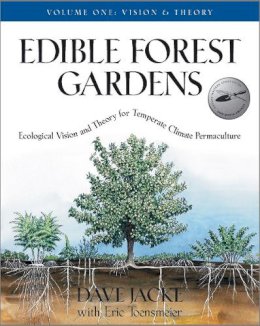
Edible Forest Gardens, Volume 1: Ecological Vision, Theory for Temperate Climate Permaculture
Dave Jacke
Edible Forest Gardens is a groundbreaking two-volume work that spells out and explores the key concepts of forest ecology and applies them to the needs of natural gardeners in temperate climates. Volume I lays out the vision of the forest garden and explains the basic ecological principles that make it work. In Volume II, Dave Jacke and Eric Toensmeier move on to practical considerations: concrete ways to design, establish, and maintain your own forest garden. Along the way they present case studies and examples, as well as tables, illustrations, and a uniquely valuable "plant matrix" that lists hundreds of the best edible and useful species.
Taken together, the two volumes of Edible Forest Gardens offer an advanced course in ecological gardening--one that will forever change the way you look at plants and your environment.
Product Details
About Dave Jacke
Reviews for Edible Forest Gardens, Volume 1: Ecological Vision, Theory for Temperate Climate Permaculture
Patricia Jonas, Brooklyn Botanic Garden- But even if you grow enough organic food to feed yourself, are you doing what's best for the ecosystem? "Many drawbacks of modern agriculture persist in organic farming and gardening," Dave Jacke and Eric Toensmeier write in Edible Forest Gardens, because they do not "mimic the structure of natural systems, only selected functions." Even Quail Hill Farm members are still harvesting mostly annual crops grown in plowed fields. Jacke and Toensmeier offer a radical vision for stepping out of the conceptual continuum of conventional agriculture and organic farming. They point to the productivity of temperate forests
which is twice that of agricultural land in terms of net calories
and take that as their design model. Building on Robert Hart's classic book, Forest Gardening, and incorporating permaculture practice, Jacke and Toensmeier propose a garden where many species of edible perennial plants are grown together in a design that mimics forest structure and function. Edible Forest Gardens is an ambitious two-volume work whose influence should extend well beyond ecologists and permaculturists and, in the best of all outcomes, reach into the mainstream. Volume one lays out the "Ecological Vision and Theory for Temperate Climate Permaculture," and it also includes a very useful analysis of existing forest gardens (one only 50 by 90 feet) and a tantalizing 30-page appendix of "top 100" species. As of this writing, volume two, which focuses on practical design and maintenance considerations, is just being released, but on the evidence of volume one, I have no doubt the set will be an indispensable reference for gardeners and farmers for decades. "When people have food gardens," the authors write, "they usually are tucked out of sight and out of view of the neighbors. They rely on external inputs of energy, nutrients, insect and disease controls, and water and are based primarily on annual plants. For some reason, growing food is considered unsightly, unseemly, possibly antisocial, and in some towns and cities, illegal! The tremendous infrastructure we have built in our cities and towns reflects a culture and horticulture of separation and isolation." The consequences of such attitudes about growing food have been disastrous, and each of us can contribute to the repair effort. Jacke and Toensmeier say that the principles of forest gardening can be applied even in a tiny urban yard or on a rooftop. Containers of edible perennials and annuals on a rooftop are not most farmers' idea of agriculture, but I grow nearly 20 percent of the authors' top 100 species and intend to look for ways to take this small start much further. And what about chocolate and oranges? Clearly there are foods that cannot be grown in a temperate forest. "We do not expect forest gardening to replace regular gardening or the foods we know and love," the authors admit. "Just how far we can take forest gardening in supplying food for ourselves is not yet determined." Finding the answer may be the most optimistic work gardeners and farmers can do. "These will be the benchmark works in the field for many years. The level of scholarship and meticulous footnoting is unsurpassed by anything I've seen in permaculture literature."
Toby Hemenway, author of Gaia's Garden
